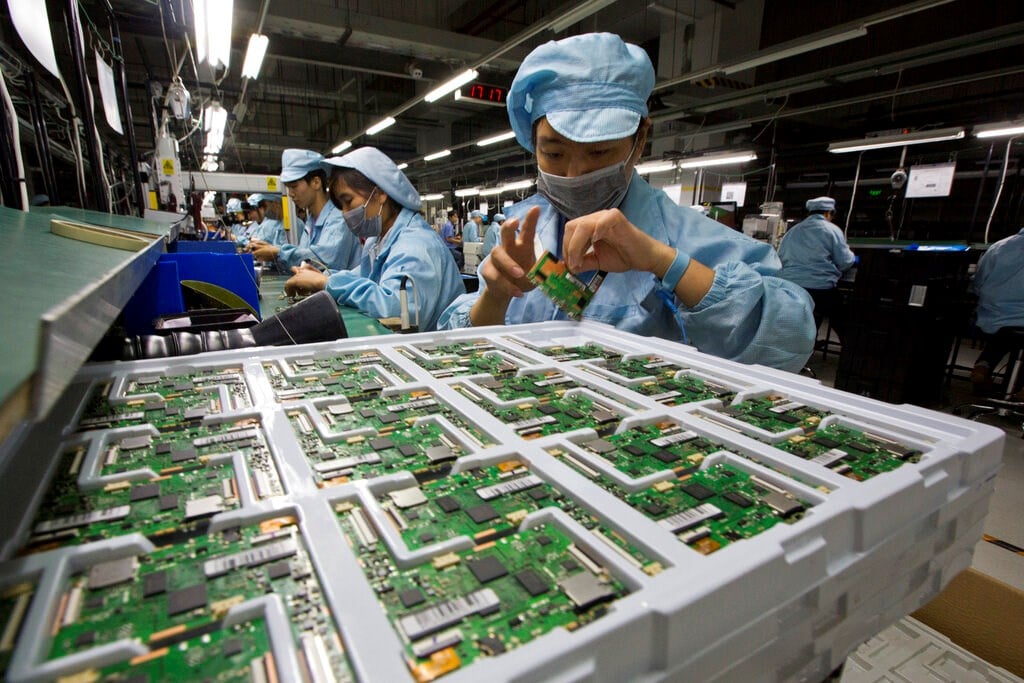China plans to build AI chips production site to counter US sanctions
China seeks to produce cutting-edge laser sources necessary for AI chip production, as scientists pick out a site for the future factory.
-

A worker assembles electronic devices at an Alco Electronics factory in Houjie Town, Dongguan City, in the Guangdong province of China, on November 10, 2015. (AP)
China is reportedly preparing to construct artificial intelligence (AI) chip factories equipped with particle accelerators, according to a report by the South China Morning Post (SCMP).
The main goal that China seeks to achieve is to produce its own particle accelerators to facilitate the creation of a cutting-edge laser source. According to SCMP, the accelerator's electron beam will undergo a transformation into a "high-quality" light source, essential for the on-site production of AI semiconductor chips.
The initiative has reportedly brought together a team of scientists from Tsinghua University, who are in active discussions with authorities in the Xiongan New Area to identify the most suitable location for the construction of these advanced chip factories.
By harnessing particle accelerators in the semiconductor manufacturing process, China seeks to reduce its reliance on foreign technologies, a move deemed critical for its economic autonomy, especially amid Western attempts to limit China's technological advance.
This development could potentially serve as a strategic workaround for current sanctions imposed on China by the US. Currently, the Netherlands-based Advanced Semiconductor Materials Lithography holds a monopoly on the technology required for the top-of-the-line machines that are necessary for advanced chip production.
The US has effectively banned the delivery of these machines to the tech industry in China in conjunction with the restriction of advanced chip sales from US-based companies to Chinese ones.
US sanctions backfire as China's tech industry booms
These particle accelerators are expected to assume a pivotal role in the semiconductor chip production pipeline, effectively supplanting the traditional lithography machine.
Building on Huawei's recent achievements, the country is set to once again leave Western skeptics in another cloud of dust.
Huawei has left tech enthusiasts in awe after it surpassed US sanctions and produced an advanced 7-nanometer processor, dubbed Kirin 9000S, to power its newest smartphone, Mate 60 Pro.
The Kirin 9000S was manufactured by China's Semiconductor Manufacturing International Corp. (SMIC), leaving a lasting impression on audiences worldwide. This achievement was especially remarkable because the company was initially believed to lack the necessary technologies and equipment to undertake such a project.
SMIC lacked the extreme ultraviolet (EUV) lithography machines produced by the same Dutch company, which would facilitate the production of 7nm chips.
Dan Hutcheson, vice chair of TechInsights, said the Kirin 9000S "demonstrates the technical progress China’s semiconductor industry has been able to make without EUV lithography tools."
Read more: China fires back at US for hacking Huawei as tech feud escalates
China to break Western monopolies
However, the SCMP report suggests that China will make yet another leap forward by producing its own advanced lithography machines, allowing it to challenge Western and Taiwanese companies in restricted markets
Beijing is concentrating efforts to lead the world in AI technology and chip production, as it has already passed legislation that regulates AI to fit its long-term vision.
On September 7, Tencent unveiled its own ChatGPT competitor, marking significant progress in the country's AI development efforts.
On the other hand, the US has exacerbated all non-confrontational efforts to constrain China's economic and technological advances, including cyberattacks, media campaigns, comprehensive sanctions, and stirring up regional tensions, all of which have fallen short of achieving their goals.
Read more: China denies government ban on iPhones but aware of security reports

 4 Min Read
4 Min Read








